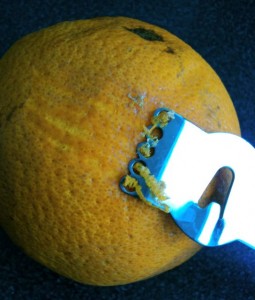 I reached a point in a recipe once where I wondered whether I could really be bothered to dry-fry coriander seeds and then crush them. The person who’d written the recipe said something about this having the intoxicating smell of burnt oranges, and that kind of convinced me. Ever since, I’ve always taken the trouble, not least because the smell really is bewitching, and does smell like burnt oranges.
I reached a point in a recipe once where I wondered whether I could really be bothered to dry-fry coriander seeds and then crush them. The person who’d written the recipe said something about this having the intoxicating smell of burnt oranges, and that kind of convinced me. Ever since, I’ve always taken the trouble, not least because the smell really is bewitching, and does smell like burnt oranges.
But then, to be realistic, of course it doesn’t. I’ve never smelled a burnt orange, and when I think about it, I should think by the time you’ve got enough heat to burn an orange, you wouldn’t smell anything anyway. At the most, just a pungent charred smell like a burnt saucepan.
That doesn’t seem to matter, however: even before I’d smelled heated coriander seeds, I could imagine the idea of burnt oranges as a nice smell, even though that concept has no real counterpart in my world.
Where’s this going? Well, the same thing applies to music. If you ever watch two dancers rehearsing, let’s say the Don Quixote pas de deux to a piano, they dance as if there was an orchestra there. They make all the gestures and expressions that go with the idea of soaring strings, singing violin solos, crashing percussion and huge orchestral cadences. Teachers say things like ‘you can hear it in the music’ when you patently can’t. And audiences don’t see anything strange about dancers making orchestral-sized gestures to piano-sized music. There’s something weird in all this – as if ‘the music’ is something that audience, dancer and musician collectively create mentally, rather than being physically present in the room.
A bit like the smell of burnt oranges.

